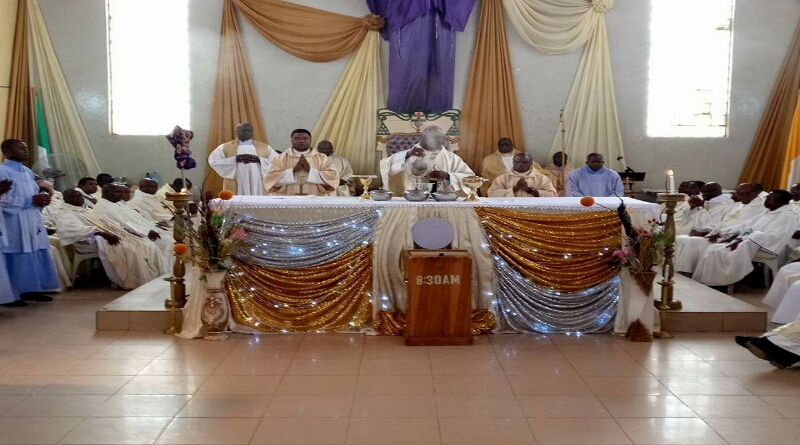Christ is King: He reigns over all
by ARCH BISHOP · November 24, 2024
Solemnity of Jesus Christ the Universal King. Our Lady Queen of Nigeria Pro-Cathedral, Abuja, 24.11.2024. Homily by Archbishop I. A. Kaigama.
Readings: Deuteronomy 7:13-14; Revelation 1:5-8; John 18:33b-37
Theme: Christ is King: He reigns over all.
If you paid a little attention to the last US election, you would have heard that while one candidate was without fear or shame declaring Jesus as Lord and King, the other candidate did not even want the name Jesus mentioned, let alone declare him as a King. We see this attitude in many so-called developed nations.
Some have gone so far as to remove any sign that symbolizes Jesus in public, while some don’t have the courage to even say “Happy Christmas“ because it contains the word “Christ.” Many prefer to hide their identity as Christians even when they know that it was the Christian religion that gave their forebears stability, hope, and the foundation to their economic, political, social, and even technological progress. As poor immigrants in far-away lands, people found hope in Christ and they built chapels first, before even building their homes in some cases.
Today, the contemporary person feeling economically and technologically advanced, believes he/she has come of age, and so, there is no need for the divine! People believe that they are powerful enough to take care of themselves, becoming anthropocentric rather than theocentric. Many want to be first instead of God. Some even say there is no God, or God does not have the wisdom they once thought He had. Even though they had no control of how they were born or how their body was made, they say they should have the absolute power to do whatever they like with their bodies: take life as it pleases them, whether in the womb or in old age or when they feel a human being has become “useless;” change at will from being a man to a woman or vice versa.
Modern man seems to be like people of the Old Testament Israel. At a certain point in their history, even though Israel enjoyed the leadership and protection of God for long, in 1 Samuel 8, we read that the people turned against the One who rescued them from slavery, provided for them in the desert, and gave them victory over their enemies. Israel instead demanded a king who would judge them, go before them, and fight their battles (cf. 1 Samuel 8:20).
Yes, they got kings as they wished, but the tragedies they faced were enormous and in many cases, the lives of the kings were anything but edifying. Even though King David, according to scripture lived a good life and was regarded as a man after God’s own heart (cf. 1 Samuel 13:14); King Hezekiah trusted deeply in the Lord and followed God’s ways (cf. 2 Kings 18:6-7) abolishing idolatrous practices; King Josiah was well-known for his efforts to purify the temple of God, removing every form of idolatrous object and practice. All of them were part of Jesus’ genealogy, but the Scripture also records the shortcomings of the kings including adultery, pride, and disobedience. The lives of Kings David, Hezekiah, and Josiah demonstrate the limitations and shortcomings of human leadership.
Today’s readings point to the King who is great and almighty, though not a king in the earthly sense. As Jesus Himself asserted, “My kingdom is not of this world” (cf. John 18:36). He is also the One foretold in the book of Jeremiah: “The days are coming, says the Lord, when I will raise up for David a righteous Branch, a King who will reign wisely and do what is just and right in the land. In his days Judah will be saved, and Israel will live in safety” (cf. Jeremiah 23:5-6).
In the first reading, Daniel describes his vision of the “Son of Man,” who is given glory and dominion. All peoples will serve Him, and His dominion is an everlasting one that will not pass away. In this kingdom, peace, justice, and truth will reign. The Gospel describes him as a king, but the king of truth.
Why the feast of Christ the King? The Feast of Christ the King was instituted at a time when respect for Christ and the Church was waning. Several years after the First World War, in 1925, Pope Pius XI instituted this solemnity when he became worried about the state of affairs around the world. Attention was shifting away from Christ to some so-called powerful leaders. In Italy, Benito Mussolini was parading around with arrogance; and in Germany, it was Adolf Hitler. Also, secularism was on the rise, and many Christians were beginning to doubt Christ’s authority and even His existence. Many were blindly following the earthly leaders. The Pope felt the need to remind people what life is about and to whom they truly belong and must pay allegiance. And so, he chose the symbolic term, king – Christ the King, and with his encyclical Quas Primas, he instituted the feast.
In fact, this feast is still needed today, as these problems have not vanished, but have rather worsened. We are so discouraged with the present condition of conflict among the nations, and the threat of new wars, corrupt leaders, overwhelming greed, individualism, terrorism and the decay of morals. By this celebration, we are reminded that Christ must reign over our lives. See how today people flaunt political power, and how people tremble and bow before those with political authority because they need political or economic favours from them. No wonder, there is a blind and aggressive search to be in positions of political power.
For us Christians, Jesus is King by every standard. Many kingdoms had existed and crumbled; many kings have come and gone, but Jesus’ kingship has no end because His kingdom has no end (Cf. Luke 1:31-33). He descended from the royal lineage of King David (cf. Matthew 1:1-18).
When the three Wise Men from the East came to visit Jesus after His birth, they asked, “Where is the child who is born the king of the Jews (Matthew 2:2)? Even the “Good Thief” on Calvary acknowledged Jesus as King. He said: “Jesus remember me when you come into your kingdom” (Luke 23:42).
By His deeds, Jesus exemplified the life of a true king and leader. He tended and cared for His flock. He Himself proclaimed: “I am the Good Shepherd” (John 10:11). Unlike the worldly kings, who tend to lord it over their subjects, often tyrannical and dictatorial, domineering and greedy, Jesus as King is humble, His yoke is easy and His burden light. He came to serve and not to be served. Jesus did not have people bowing before Him; instead He Himself bowed and washed their feet. He had no army guarding Him, He only had disciples. He sat on no throne, but rather on a donkey’s back. He wore no crown of gold, but of thorns. He did not take life, He gave life. He did not set boundaries, but included sinners, tax collectors, thieves and saints alike, in His Kingdom. He did not exploit people but spoke sympathetically of widows, prodigal sons, good Samaritans, and poor farmers. He did not force, rather, he invited. Christ’s Kingship had nothing to do with crowns, palaces, or robes as that of our present-day kings, rulers, or presidents whose interest is that of flamboyance, luxury, and affluence. Rather, it has something to do with self-abasement and selfless service to humanity. Jesus was the poorest king that ever lived. Even His tomb, His death bed, was borrowed. Possessing nothing, He owned all.
The second reading presents us with the insight, that we share in the kingship of Christ, for Christ declared that “he has made us a kingdom, priests to his God and Father” (1:5-6). We are privileged to share in this kingship of Christ by virtue of our baptism, therefore, it is to strive to get rid of selfishness and be concerned for the rights and welfare of others, especially the less fortunate and those we lead. It means we need to work to establish justice, equity and fair play wherever we find ourselves, as leaders, shunning corruption and nepotism. As we reflect on Christ’s kingship, we are invited to welcome Him as the King of our hearts and our world. Are we prepared to surrender to His reign and follow His example of servant leadership?
We are challenged to see Christ in others, our politicians should promote a kingdom of love, justice, truth and peace. We should realize that at the end of time, every individual with or without political authority will have a direct encounter with the Lord Jesus Christ. This encounter will be the last judgment as we will all stand before Christ. Therefore, let us live a life of service and sacrificial love.




